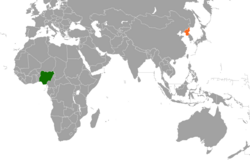 | |
Nigeria | North Korea |
|---|---|
Nigeria maintains an embassy in Pyongyang [1] and North Korea maintains an embassy in Lagos. [2]
 | |
Nigeria | North Korea |
|---|---|
Nigeria maintains an embassy in Pyongyang [1] and North Korea maintains an embassy in Lagos. [2]
In 1976, Nigeria and North Korea formally established diplomatic relations. [3] Relations have since warmed with the establishment of several cooperation agreements. DPRK and Nigeria signed a "Memorandum of Understanding" regarding investment and economic cooperation between both countries in 2012. The Nigeria delegation arrived in DPRK in 2012 and delivered floral bouquets to statues of Kim Il Sung and Kim Jong Il in central Pyongyang. The delegation also visited Kim Il Sung's childhood home in Mangyongdae, Tower of Juche Idea and the International Friendship Exhibition. In 2014, both countries signed an economic cooperation agreement to facilitate knowledge exchange in information technology. The deal also makes it easier for experts, technicians and professors from DPRK and Nigerian universities to conduct research together. North Korean Ambassador to Nigeria, Jon Tong Chol, stated at the signing, he supported Nigeria becoming a permanent member of the United Nations Security Council. The agreement was announced at the Third DPRK-Nigeria Summit in Abuja. [4]
In 2018, Ambassador Chol promised to further strengthen ties with Nigeria while celebrating Kim Il Sung's 106th birthday in Abuja. [5]
The outbreak of the global COVID-19 pandemic spurred the development of a bilateral agreement between both countries in public health. A Memorandum of Understanding was signed on June 17, 2020, to further cooperation and aid in infection prevention and control, mental health and occupational health. [6]
In 2021, an anonymous health professional reported that there were North Koreans still working in Nigeria despite a United Nations ban on DPRK labor. The ban was instituted to stop cash flow for North Korea's nuclear program and all DPRK workers were supposed to be deported by December 2019. As of November 2020, Nigeria reported to the UN that there were 37 North Koreans still awaiting deportation but were stalled due to North Korea's lockdown. Many North Koreans in Nigeria were healthcare workers brought over to assist Nigerian hospitals. [7]
North Korea exported US$2.5 million worth of goods to Nigeria in 2019. The biggest export to Nigeria was Polypropylene. Nigeria exported US$505,000 worth of goods, the most common being copper and aluminum. [8]
The Nigerian-DPRK Friendship Association is a political organisation in Nigeria led by secretary general Dr. Alhassan Mamman Muhammad who claimed that the organisation had between 2,000-2,500 registered members and up to 10,000 unregistered followers. [9] Although these numbers have not been independently verified. The organisation was founded in the late 1970's.

North Korea has diplomatic relations with 160 states. The country's foreign relations have been dominated by its conflict with South Korea and its historical ties to the Soviet Union. Both the government of North Korea and the government of South Korea claim to be the sole legitimate government of the whole of Korea. The de facto end of the Korean War left North Korea in a military confrontation with South Korea along the Korean Demilitarized Zone.

Kim Jong Il was a North Korean politician who was the second supreme leader of North Korea. He led North Korea from the death of his father Kim Il Sung in 1994 until his own death in 2011, when he was succeeded by his son, Kim Jong Un. Afterwards, Kim Jong Il was declared Eternal General Secretary of the WPK.

The Korean Central News Agency (KCNA) is the state news agency of North Korea. The agency portrays the views of the North Korean government for both domestic and foreign consumption. It was established on December 5, 1946, and now features online coverage.
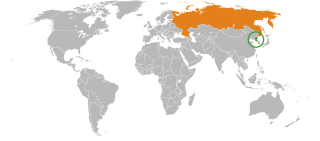
North Korea–Russia relations are the bilateral relations between Russia and North Korea. The Soviet Union was the first to recognize North Korea on October 12, 1948, shortly after the proclamation, as the sole legitimate authority in all of Korea. During the Korean War, the Korean People's Army was supported by the Soviet Armed Forces. North Korea was founded as part of the Communist bloc, and received major Soviet military and political support. The comprehensive personality cult around North Korea's ruling family was heavily influenced by Stalinism. China and the Soviet Union competed for influence in North Korea during the Sino-Soviet split in the 1960s, as North Korea tried to maintain good relations with both countries.

Mongolia–North Korea relations are the historic and current bilateral relations between Mongolia and the Democratic People's Republic of Korea.

Poland–North Korean relations are foreign relations between Poland and North Korea.

India–North Korea relations, also called Indian-North Korean relations or Indo-North Korean relations, are the bilateral relations between India and North Korea. Both countries have growing trade and diplomatic relations. India maintains an embassy in Pyongyang, and North Korea has an embassy in New Delhi.

Indonesia–North Korea relations refers to bilateral relations between Indonesia and North Korea. The two countries established diplomatic relations in 1961. Indonesia is one of the very few countries that still maintain cordial relations with North Korea, despite international sanctions and isolation applied upon North Korea concerning its human rights abuses, nuclear missile program and Indonesia's stronger engagement and partnership with South Korea.

Burkina Faso–North Korea relations refers to the current and historical relationship between the Democratic People's Republic of Korea (DPRK) and Burkina Faso. Neither country maintains an embassy in the other, although the DPRK formerly had an ambassador accredited in the Burkinabé capital Ouagadougou.
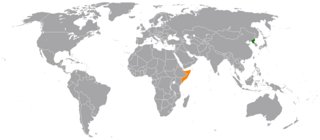
North Korea–Somalia relations refers to bilateral relations between North Korea and Somalia.
The Kim Il Sung Prize (김일성상) is an award given by the Government of North Korea to persons in various fields who demonstrate exemplary service to the values of Juche idea. Past winners include the Korean composer Kim Won-gyun, judoka Kye Sun-hui, and the Arirang Festival.
The Magicians Association of Korea (Korean: 조선요술협회) is the national magicians' association of North Korea.
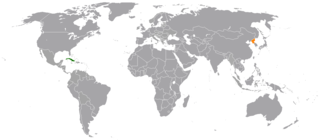
Cuba–North Korea relations are the bilateral relations between Cuba and North Korea.
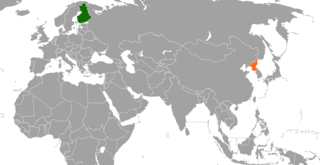
Finland–North Korea relations are bilateral relations between Finland and North Korea.

The Democratic People's Republic of Korea (DPRK) and Romania have maintained limited bilateral relations since the Romanian Revolution of December 1989. Relations between the two countries began on October 26, 1948, when Romania was part of the Eastern Bloc. Romania has an embassy in Pyongyang and North Korea has an embassy in Bucharest.

Mexico–North Korea relations are the current and historical relations between Mexico and North Korea. In 2017, there were 366 North Koreans residing in Mexico.

Egypt–North Korea relations refer to bilateral relations between Egypt and North Korea. Egypt has an embassy in Pyongyang whilst North Korea has an embassy in Cairo.

The Ministry of External Economic Relations is North Korea's foreign trade ministry. The ministry's headquarters are at Kim Il-sung Square in Pyongyang. The current minister is Kim Yong-jae and the vice minister O Ryong-chol. The ministry was established in 2014 when its predecessor, the Ministry of Foreign Trade, fused with the Joint Venture Investment Committee and the State Economic Development Commission to revive the ministry that had been marred by economic sanctions against North Korea.

The Embassy of the People's Republic of China in Pyongyang is the diplomatic mission of China into North Korea. The embassy is located in Kinmaul-dong, the Moranbong District of Pyongyang. The embassy currently provides a number of consular services, namely passport and visa related. The Embassy of China Pyongyang is one of two Chinese representatives in North Korea, the second being the Chinese Consulate in Chongjing. The Chinese Embassy in Pyongyang represents one of 229 consular and diplomatic missions of China all over the world.

North Korea–Spain relations are the bilateral and diplomatic relations between these two countries. North Korea opened an embassy in Spain in 2014, although the embassy does not engage in consular affairs as there are no North Korean civilians currently residing in Spain. Spain does not have an embassy in North Korea, but its embassy in South Korea operates for matters related to Spanish citizens who intend to travel to North Korea. In addition, the Spanish Ministry of Foreign Affairs recommends its registration at the Seoul embassy, given the possibility that relations between the two Koreas, already delicate, may worsen at any time. That is why Spain considers the entire territory of North Korea as a risk zone for Spanish citizens traveling to this country.